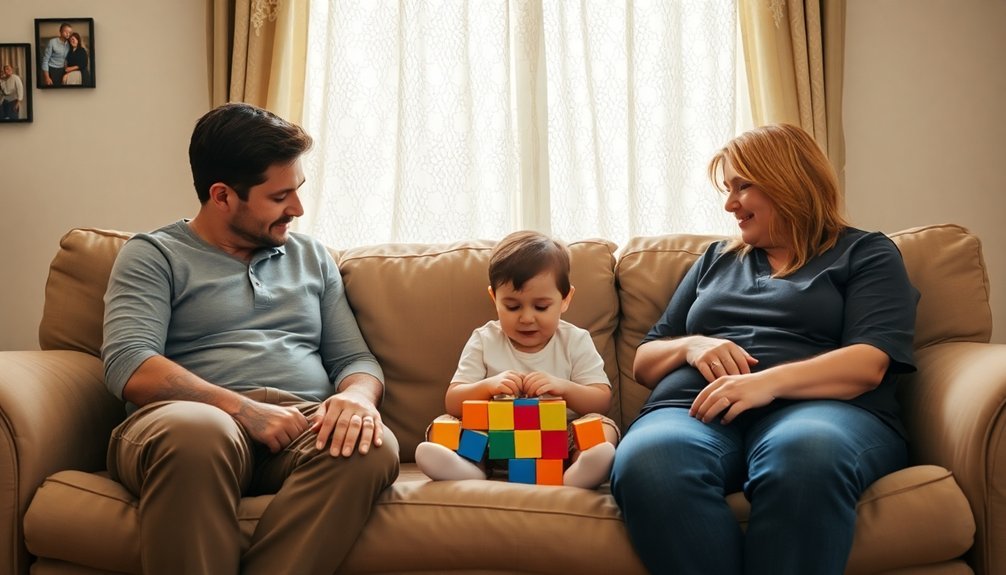You've probably noticed how your marriage has evolved since having children, with date nights giving way to soccer practice and intimate conversations replaced by parent-teacher conferences. This shift toward a parenting-focused partnership isn't just common—it's becoming a conscious choice for many couples who want to maintain family stability while acknowledging their changed dynamic. Whether you're already operating in this mode or considering it as an alternative to traditional marriage or divorce, understanding the framework of a parenting marriage can help you navigate this increasingly popular approach to family life. Let's explore what this arrangement really means and how it might work for your situation.
Key Takeaways
- A parenting marriage prioritizes cooperative child-rearing over romantic partnership while maintaining legal marriage status.
- Parents create a stable environment by focusing on shared responsibilities and consistent routines for their children's well-being.
- Couples maintain separate personal lives while collaborating effectively on parenting decisions and household management.
- Regular communication about non-parenting topics and scheduled check-ins help preserve connection within the relationship.
- Clear financial agreements and boundaries ensure smooth co-parenting while respecting each partner's independence.
What Is A Parenting Marriage
When couples find themselves growing apart emotionally but want to maintain stability for their children, a parenting marriage can offer a practical alternative to divorce. In this arrangement, you and your partner consciously decide to shift your relationship's focus from romantic partnership to cooperative parenting. You'll maintain your marriage legally while redefining your roles primarily as co-parents rather than romantic partners.
A parenting marriage transforms your relationship dynamics into a partnership centered on raising children together. You'll establish new boundaries and expectations, focusing on shared responsibilities like managing the household, attending children's activities, and making joint decisions about education and healthcare.
While you may live in the same home, you're free to develop separate social lives and interests outside of your parenting duties. This arrangement isn't about pretending everything's perfect – it's about creating a stable, nurturing environment for your children while acknowledging your changed relationship.
You'll need to develop clear co-parenting dynamics, including communication protocols, division of tasks, and financial agreements. Think of it as a conscious choice to prioritize your children's wellbeing while maintaining family unity in a redefined way.
Signs Your Marriage Is Shifting

You might notice your marriage shifting when date nights become increasingly rare and physical intimacy dwindles to quick pecks or mechanical hugs.
Your conversations with your spouse now revolve almost exclusively around the children's schedules, school events, and parenting challenges.
These changes often creep in gradually, but recognizing them early can help you take proactive steps to maintain your connection as both parents and partners.
Date Nights Become Rare
Date nights gradually fade into distant memories as couples shift their focus entirely to parenting responsibilities. You might find yourself struggling to remember the last time you and your partner enjoyed an evening out together, just the two of you.
Between managing your children's schedules, household duties, and work commitments, relationship rejuvenation often takes a back seat.
When you're constantly juggling the demands of parenthood, it's easy to rationalize skipping date night. You might feel guilty about leaving the kids with a sitter or worry about the added expense.
Perhaps you're simply too exhausted to plan an evening out. Yet, this decrease in couple time can signal a significant shift in your marriage's dynamics.
You can reverse this pattern by starting small. Consider implementing at-home date nights after the kids are asleep, or schedule brief coffee dates during lunch breaks.
Even fifteen minutes of undivided attention can help maintain your connection. Remember, prioritizing your relationship doesn't make you a less devoted parent – it actually models healthy partnership for your children and strengthens your family unit.
Less Intimate Physical Contact
Physical intimacy often diminishes in three distinct ways during the parenting-focused marriage: spontaneous affection becomes rare, bedroom activities decline, and casual touching throughout the day virtually disappears.
You might recognize these signs of affection decline in your own relationship:
- Your goodbye kisses have become quick pecks or forgotten entirely
- You can't remember the last time you held hands while walking together
- The couch feels wider as you sit on opposite ends during evening TV time
- Your morning cuddles have been replaced by rushing to get the kids ready
- You've stopped touching each other's arm or shoulder when talking
This emotional distance doesn't mean your love has faded – it's often just buried under the demands of parenthood.
You can rebuild physical connection through small, intentional moments. Try setting a daily five-minute timer for hugging, create a bedtime ritual of holding hands while sharing your day, or simply brush past each other with a gentle touch in the kitchen.
All Conversations About Kids
Three classic signs reveal when parenting has overtaken your marriage: dinner conversations revolve entirely around the kids' activities, date nights turn into planning sessions for family logistics, and casual chats with your spouse drift inevitably to children's needs.
While discussing your children is natural and necessary, limiting conversations solely to parenting styles and child-related topics can gradually erode your connection as a couple. You might find yourself struggling to remember the last time you talked about your personal dreams, shared a joke, or explored topics beyond family responsibilities.
To restore balance, try implementing specific communication strategies. Set aside dedicated time each day for non-kid conversations, even if it's just 15 minutes. During these moments, discuss your individual interests, work life, or current events.
Consider establishing a "no kid talk" rule during date nights, focusing instead on rekindling your romantic connection. When parenting discussions are necessary, schedule them for specific times, treating them like any other important meeting. This structured approach helps guarantee that children's needs are met while maintaining your identity as individuals and as a couple.
Benefits For Children

Your children will thrive in the stability that a parenting marriage provides, as they maintain their familiar home environment and daily routines.
You'll notice reduced tension in your household when you and your partner focus primarily on your shared commitment to parenting rather than struggling with marital conflicts.
Stable Home Environment
Studies consistently show that children thrive in a stable, predictable home environment. When you choose a parenting marriage, you're creating a foundation of stability through supportive teamwork and consistent routines. Your children benefit from knowing what to expect each day, from breakfast routines to bedtime rituals.
Your commitment to maintaining a peaceful household creates an emotional safety net for your children. They'll feel secure knowing that both parents are dedicated to their well-being, even if romantic love isn't part of the equation.
Through stable routines and unified parenting, you're showing your children what mature problem-solving looks like.
- Your children wake up knowing both parents are there for them
- They experience less anxiety about family stability
- They learn healthy conflict resolution by watching your teamwork
- They develop confidence in their family unit's strength
- They benefit from predictable daily patterns that create security
Reduced Parental Conflict
Children living within a parenting marriage often experience considerably less conflict between their caregivers. When you prioritize your parenting role over your romantic relationship, you'll find that many common sources of marital tension naturally dissipate.
You're no longer caught up in the emotional turbulence that often accompanies traditional marriage struggles, allowing you to focus on what matters most – your children's well-being.
In a parenting marriage, you'll develop stronger conflict resolution skills because you're approaching disagreements from a co-parenting perspective rather than an intimate partnership stance.
You'll find yourself adopting more effective communication strategies, as your shared goal becomes raising healthy, well-adjusted children rather than maintaining a romantic connection.
Your children won't have to witness heated arguments or feel caught in the middle of adult relationship issues.
Instead, they'll see two adults working together respectfully, modeling healthy problem-solving behaviors.
This reduction in parental conflict creates an emotionally safer space for your children, allowing them to focus on their own development without carrying the burden of their parents' relationship struggles.
Common Challenges And Solutions

Three significant challenges often arise in parenting marriages, but each has workable solutions that can help you maintain stability and harmony. Through effective communication strategies and mindful co-parenting dynamics, you'll find that most obstacles become manageable stepping stones toward a healthier family environment.
When you're feeling overwhelmed, remember you're not alone. Many parents in similar situations have successfully navigated these waters. Consider these emotional touchpoints that can help you stay focused:
- Your children's well-being remains the beautiful core purpose that unites you both.
- Every small step forward in cooperation strengthens your family's foundation.
- You're creating a unique legacy of putting your kids' needs above personal differences.
- Growth comes from facing challenges together, even when it feels difficult.
- Your commitment to this arrangement shows remarkable strength and wisdom.
To overcome common hurdles, establish clear boundaries, create structured routines, and maintain open dialogue about expectations.
When you encounter resistance or doubt, return to your shared goals. Remember that flexibility and patience are your allies in this journey, and seeking professional guidance when needed isn't a sign of weakness but of commitment to your family's success.
Setting Clear Boundaries Together

Building a strong parenting marriage starts with establishing well-defined boundaries that both partners understand and respect. Through boundary setting, you'll create a framework that helps maintain harmony in your relationship while putting your children's needs first.
Start by sitting down together and having an open discussion about your individual needs, concerns, and expectations. You'll want to address key areas like parenting decisions, personal space, and time management. Make sure you're both actively participating in this conversation and working toward mutual agreement on each point.
Create specific guidelines for handling disagreements, especially when they arise in front of the children. You might decide, for example, that all major parenting decisions require a private discussion away from little ears.
Also, establish boundaries around personal time – each partner needs space to recharge.
Document your agreements and revisit them regularly. As your children grow and circumstances change, you may need to adjust these boundaries.
Financial And Legal Considerations

Stability in financial and legal matters forms the backbone of a successful parenting marriage. When you're prioritizing your children's wellbeing, it's crucial to establish clear financial planning strategies and legal agreements that protect everyone involved.
You'll want to work with professionals who understand your unique situation and can guide you through the process.
Your parenting marriage requires thoughtful consideration of these critical aspects:
- Creating separate and joint banking accounts to maintain financial independence while sharing child-related expenses
- Establishing clear written agreements about property ownership, debt responsibilities, and asset division
- Developing a thorough budget that prioritizes your children's needs while respecting both parents' financial goals
- Setting up estate planning documents, including wills and guardianship arrangements, to protect your children's future
- Maintaining detailed records of shared expenses and financial contributions to prevent misunderstandings
Remember that financial transparency and legal protection aren't just practical matters – they're foundations of trust in your parenting partnership.
Making The Transition Work

Shifting to a parenting marriage requires patience, open communication, and a willingness to adapt. As you navigate this change, remember that your children's well-being remains the central focus.
Start by establishing clear co-parenting strategies that outline responsibilities, schedules, and decision-making processes.
You'll need to develop new communication patterns with your spouse. Set regular check-ins to discuss parenting matters, and create boundaries around personal topics that aren't related to the children.
It's helpful to use shared calendars, messaging apps, or co-parenting tools to maintain effective communication while respecting each other's space.
Consider working with a family therapist who can guide you through this change and help you develop healthy coping mechanisms. They can provide strategies for managing emotional challenges and maintaining a stable environment for your children.
Remember that you're not alone in this journey – many families successfully navigate this adjustment.
Be prepared for an adjustment period as you and your spouse settle into your new roles. Focus on consistency in your parenting approach, and remain flexible as you discover what works best for your family's unique situation.
Frequently Asked Questions
How Do You Tell Extended Family About Your Decision to Have a Parenting Marriage?
When sharing your decision with extended family, choose a calm moment and plan your communication strategy carefully.
You'll want to be clear, honest, and united with your co-parent. Explain that you're prioritizing family dynamics that work best for your children.
Remember, you don't need to justify your choice – focus on how this decision strengthens your family unit.
Consider meeting with closest relatives first before sharing with others.
Can Couples Successfully Return to a Romantic Marriage After Parenting Marriage?
After feeling like you've crossed a million miles of emotional distance, returning to a romantic connection is possible – though it requires dedication from both partners.
You'll need to consciously rebuild intimacy through date nights, meaningful conversations, and shared experiences.
Many couples successfully achieve relationship rejuvenation by working with counselors and setting intentional couple time.
What Age of Children Typically Handles the Transition to Parenting Marriage Best?
When considering the change to a parenting-focused relationship, you'll find that children's age considerations and emotional maturity play important roles.
Kids between ages 8-12 often handle this shift best, as they're old enough to understand family dynamics but young enough to adapt easily.
You're likely to see more success with school-age children who've developed basic emotional regulation skills.
Should Both Parents Date Other People During a Parenting Marriage Arrangement?
While you're free to date during a parenting marriage, it's essential to establish clear dating boundaries with your co-parent first.
You'll want to discuss how and when to introduce new partners, and how this might affect your co-parenting dynamics.
Consider your children's emotional well-being and comfort level.
Many successful parenting marriages work best when both partners agree on dating protocols and maintain open, honest communication about their dating lives.
How Often Do Parenting Marriages Eventually Lead to Divorce?
Picture two ships gradually drifting apart on life's vast ocean.
While specific divorce statistics for parenting marriages aren't widely tracked, you'll find that these arrangements often lead to eventual separation.
The unique parenting dynamics can either strengthen your bond through shared purpose or highlight existing differences.
Many couples find that once their children are older, they're ready to formally part ways.
You're not alone if you're experiencing this natural evolution.
Conclusion
While statistics show that nearly 40% of couples experience decreased marital satisfaction after having children, you're not alone in prioritizing parenting over romance. Your parenting marriage can thrive when you're intentional about communication, boundaries, and shared goals. Remember, you're creating a stable foundation for your children while modeling healthy relationships. With clear expectations and mutual respect, you'll navigate this change successfully and create lasting family harmony.





0 responses to “The Parenting Marriage: When Kids Come First”